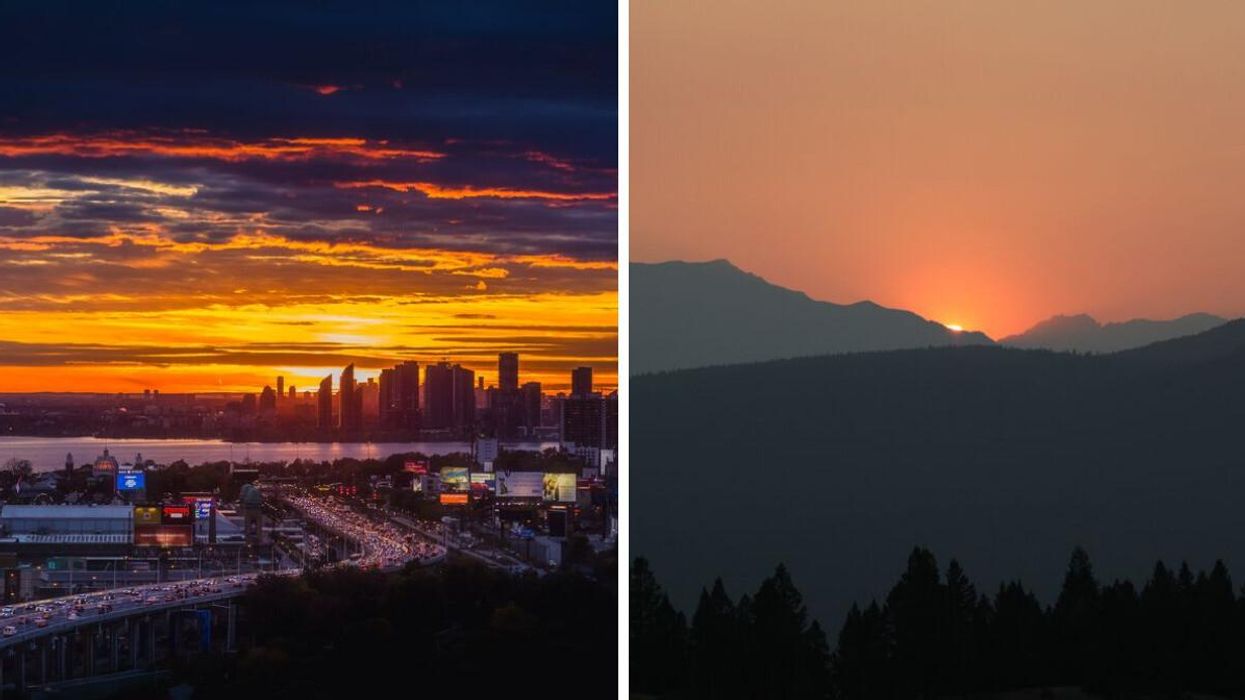Daylight Saving Time Is Ending & Canada's Earliest Sunset Will Be At 1:41 pm After Clocks Change
Say goodbye to sunshine in the evening! 👋

Sunset behind buildings in Toronto. Right: The sun going down behind a mountain in B.C.
The clocks are going back in most of Canada as daylight saving time comes to an end and that means some parts of the country are in for early sunsets.
After clocks change at 2:00 a.m. local time on Sunday, November 6, 2022, a bunch of places will gain an hour meaning there will be more daylight in the morning but less in the evening.
The sunset will get earlier and earlier in November until it reaches its earliest time of the year in December.
In Yellowknife, sunset is at 4:14 p.m. on November 6 when the time changes and 3:03 p.m. on December 14.
Iqaluit's sunset will be at 3:03 p.m. on November 6 and 1:41 p.m. on December 15!
In Vancouver, the sun will go down at 4:42 p.m. on the day that daylight saving time ends and then at 4:13 p.m. on December 8.
People in Calgary will see the sunset at 5:01 p.m. on November 6 and it will get earlier each night until December 8 when it sets at 4:29 p.m.
Winnipeg's sunset is at 4:57 p.m. on November 6 and then at 4:27 p.m. on December 6 thanks to the time change.
Toronto will get the sunset at 5:01 p.m. on November 6 and the earliest time it'll go down this year is at 4:40 p.m. on December 5.
In Montreal, the sunset is at 4:34 p.m. when daylight saving time ends and then at 4:10 p.m. on December 7.
In Fredericton, the sunset after the clocks go back on November 6 is actually pretty late at 5:05 p.m. The earliest it will go down this year is 4:41 p.m. on December 5
Halifax's sunset will be at 4:56 p.m. on November 6 and then at 4:33 p.m. on December 7.
For people in Charlottetown, the sun will go down at 4:50 p.m. on November 6 and 4:26 pm on December 5.
In St. John's, the sunset is at 4:36 p.m. when the time changes. Then it'll happen earlier and earlier until it reaches its earliest time of the year at 4:09 p.m. on December 6.
What is daylight saving time?
Daylight saving time is when the clocks go forward one hour from standard time during the summer months and then go back an hour to standard time in the fall.
The time change that happens twice a year is meant to make better use of natural daylight, according to Time and Date.
Is Canada getting rid of daylight saving time?
In Canada, time zones and daylight saving time have been typically regulated by provincial and territorial governments throughout history rather than the federal government.
Since, daylight saving time is determined by provincial and territorial legislation, it's possible for some places in this country to observe the twice-a-year time change while other spots don't change the clocks at all.
Most of Saskatchewan uses standard time all year round so the clocks don't spring forward or fall back.
Back in 2019, B.C. passed legislation that outlined its plan to switch to a standard pacific time along with Washington, Oregon and California but the switch hasn't happened yet.
Then, in March 2020, Yukon got rid of time changes and now the territory is on Yukon Standard Time all year.
Some politicians in Ontario have been trying to get rid of time changes but so far it hasn't happened because the province needs its neighbours to also get on board.
One of those neighbours is Quebec and while Premier François Legault has said he was "open" to switching to one permanent time, the province hasn't moved forward with anything.